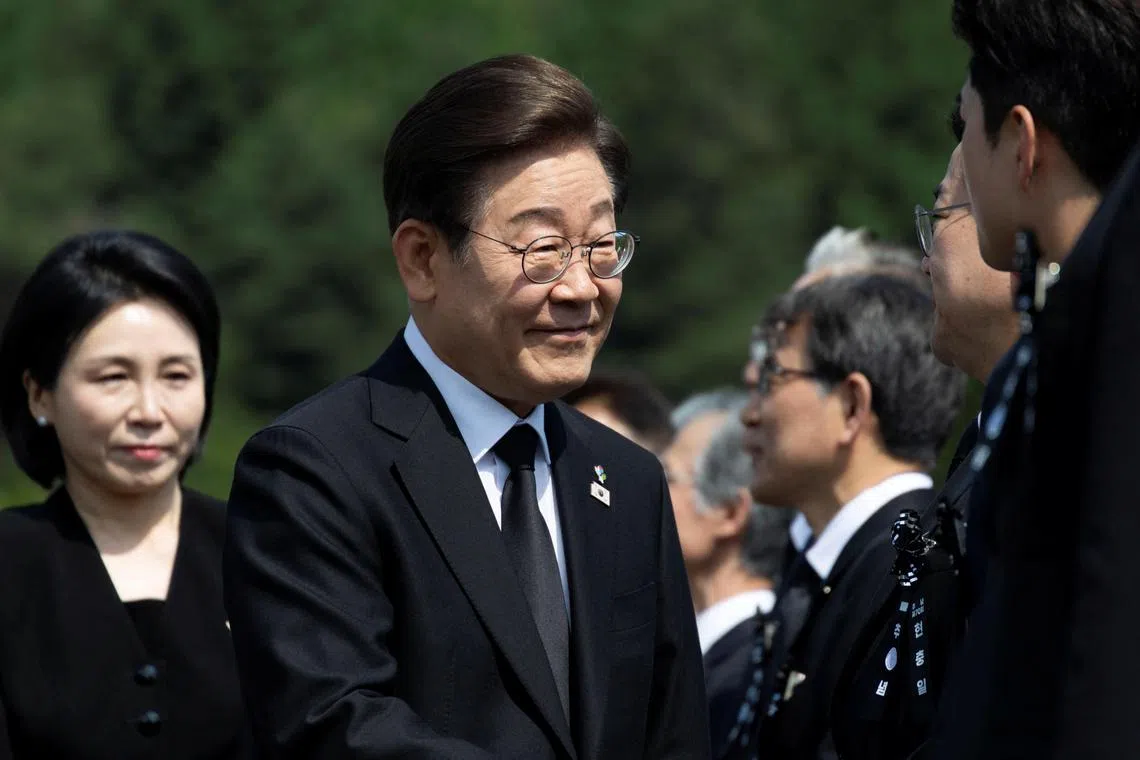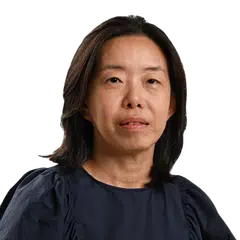At G-7 summit, S. Korea’s President Lee faces delicate balance in US-China rivalry
Sign up now: Get insights on Asia's fast-moving developments

South Korea’s new President Lee Jae-myung and his wife Kim Hye-kyung (left) at the Seoul National Cemetery on June 6.
PHOTO: REUTERS
Follow topic:
SEOUL – As South Korea’s new President Lee Jae-myung gears up for his international diplomacy debut at the Group of Seven (G-7) summit next week, all eyes are on whether he will be made to pick sides in the Sino-American rivalry.
Mr Lee has acknowledged that the South Korea-US alliance remains the foundation of South Korea’s diplomacy and security, and has pledged to strengthen the alliance along with the trilateral partnership with Japan.
But he has also said South Korea should not be made to choose between the United States and China and “put all our eggs in one basket”.
Mr Lee was elected with a 49.42 per cent mandate in a snap election on June 3 Yoon Suk Yeol’s failed martial law bid
Mr Lee’s win under the liberal flag, which traditionally prioritises relations with China and engagement with North Korea, has Washington watching his foreign policy directions closely, said Dr Lee Seong-hyon, a senior fellow at the Washington-based George H.W. Bush Foundation for US-China Relations.
The previous conservative administration under Yoon had antagonised Beijing by openly taking sides with the US, and also seeding rife speculation of Chinese espionage and interference in South Korean domestic politics.
During his election campaign, Mr Lee had taken a more centrist stance by repeatedly emphasising a non-committal “pragmatic diplomacy” to maximise South Korea’s national interests.
Amid growing rivalry between the two superpowers, however, Mr Lee’s vision, which requires a delicate balancing act between its biggest security ally, the US, and its largest trading partner, China, will likely be put to the test.
US Defence Secretary Pete Hegseth had earlier cautioned allies against playing both sides by “seeking both economic cooperation with China and defence cooperation with the United States”, during his speech at the Shangri-La Dialogue,
Mr Hegseth had also urged allies to increase their defence spending as a regional deterrence against China.
Seoul’s share of the defence cost for US troops stationed in South Korea has been a major bugbear of US President Donald Trump, who has said that “money machine” South Korea can afford to pay much more.
Recently leaked plans about the possibility of the US redeploying its forces stationed in South Korea to other parts of the Pacific
South Korea’s participation as an observing country at the G-7 summit over June 15 to 17 in Vancouver is, thus, seen as important. Issues related to China, Russia and North Korea are expected to feature high on the agenda.
Besides the US, other members of the political and economic forum are Canada, France, Germany, Italy, Japan and Britain.
Seoul is also pushing hard for a face-to-face meeting between Mr Lee and Mr Trump on the sidelines of the meeting to ride on the momentum of the first phone call between the two leaders that took place on June 6.
The 20-minute courtesy call ended with an agreement to meet in person at the earliest possible opportunity for more in-depth talks.
The call took place later than usual – three days after Mr Lee was elected – causing concern when it had not happened.
Past South Korean presidents had traditionally spoken to their biggest ally either on the day of their election or the day after.
A cryptic congratulatory message issued by the White House after the election had affirmed the “ironclad alliance” between the US and South Korea, before going on to express concern over “Chinese interference and influence in democracies around the world”.
That had fuelled speculation that the message was a hint for the new Lee administration to distance itself from Beijing.
While Washington does not expect Mr Lee’s administration to “diverge significantly from the established US-South Korea alliance framework”, it will nevertheless be keenly watching any potential policy reversals, such as weakening ties with Japan while gravitating towards China and resuming inter-Korean engagement, Dr Lee told The Straits Times.
Research fellow Lee Dong-gyu, from the Asan Institute for Policy Studies in Seoul, said the broaching of the idea of a US troop drawdown could be a diplomatic signal to South Korea to step up and play “an augmented role” to contain China.
“But if the new government under Mr Lee pursues a revitalisation of South Korea-China relations, then it may result in the erosion of US containment efforts,” he said.
While it is clear that President Lee’s priority is in forging ties with Mr Trump and ironing out tariff negotiations before the July 9 deadline, rising tensions over Chinese-built structures in the South Korea-China Provisional Maritime Zone in the West Sea will also be an immediate test of his diplomacy tightrope act, said professor of international politics Mason Richey from Hankuk University of Foreign Studies.
He added that Seoul needs to be prepared to respond strategically, and “to be clear with China that even though they are economic partners, South Korea will not be easily bullied”.
After his first phone call with Chinese President Xi Jinping on June 10, Mr Lee called China an important partner to South Korea “in all aspects, including economy and security” and said that he looks forward to developing relations between Seoul and Beijing.
Mr Lee has also asked China to play a constructive role in the denuclearisation of the Korean peninsula, to which Mr Xi replied that promoting peace and stability on the peninsula was a matter of mutual interest to both South Korea and China.
Carnegie Mellon Institute for Strategy and Technology’s non-resident fellow, Dr Troy Stangarone, told ST that while the new administration’s repairing of relations with China is a priority after the deterioration of ties under the previous Yoon administration, it will need to “take a realistic view of the relationship”.
He believes that Mr Lee would likely have a bit more time before being made to pick sides between the US and China at the G-7 summit, as South Korea is ultimately not a member country but just an observer.
However, he warns that “geostrategic shifts and US-China rivalry may create limits to improving relations with China”.
“The Lee administration should focus its efforts on maintaining good economic ties, while also working to bring China back as a constructive partner for dealing with the North Korean nuclear issue,” he said.
Wendy Teo is The Straits Times’ South Korea correspondent based in Seoul. She covers issues concerning the two Koreas.


